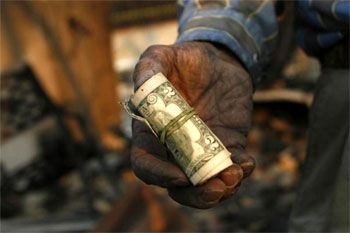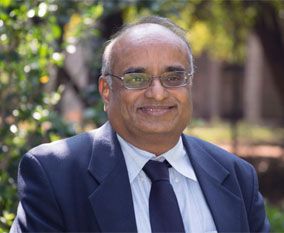'Unlike money stashed abroad, domestic black money is not idle'
'Black money that is stashed abroad is around $1.5 trillion'
 R Vaidyanathan (bottom, left) has been a professor of finance and control at the Indian Institute of Management, Bangalore, since 1991. He is a member of many committees including that of the Securities and Exchange Board of India.
R Vaidyanathan (bottom, left) has been a professor of finance and control at the Indian Institute of Management, Bangalore, since 1991. He is a member of many committees including that of the Securities and Exchange Board of India.
He was a member of the task force constituted by L K Advani in 2009 before the Lok Sabha elections to study black money. Other members of the task force were S Gurumurthy, former Intelligence Bureau director Ajit Kumar Doval and Mahesh Jethmalani.
His last book titled India Uninc -- about Unincorporated Sector in the Indian economy, is about the unorganised sector in India in which he has written about the need to have an organised banking sector for the largest provider of employment. Naturally, he thinks Mudra Bank for the unorganised sector announced by the Finance Minister in his budget, is a game changer.
In this more than an hour-long chat with Shobha Warrier/Rediff.com at IIM-B, Vaidyanathan talks about black money, Mudra Bank and Jaitley’s Budget.
Are you happy with Budget 2015?
As a finance professor, I never give too much importance to budgets.
Do you feel there is too much hype on budget presentation in India?
Yes, too much media hype. Some people start calling it a ‘Dream Budget’, ‘Super Budget’, etc. These days, even school students have wishlists before the Budget! I have heard some school students say, chocolates should be cheaper!
Do you feel the Budget is pro-rich and anti-poor?
I don’t think it is a pro-rich and anti-poor Budget. Just because Jaitley has cut corporate tax by five per cent, you can’t call it a pro-rich Budget. You see, shareholders do not pay any tax on the dividend they earn. There are people who earn Rs.100-150 crore as dividend but do not pay tax.
 Do you think the 10-year imprisonment and the 300 per cent tax announced by Jaitley will act as a deterrent to hold black money?
Do you think the 10-year imprisonment and the 300 per cent tax announced by Jaitley will act as a deterrent to hold black money?
There are two issues in it. How is he going to pass the regulatory framework? Even if it is passed, can black money be looked at only as a tax issue? The funds abroad is not just tax evasion. Money given as bribe, for example, when the government buys defence material, is not tax evasion. It is corruption. Similarly, in human trafficking also, money is exchanged. Unfortunately, everything is put under tax evasion.
Unless the law comes, you will not be able to say how it will affect and whether it will act as a deterrent. Now, he has only mentioned in the budget. In India, we have laws, rules and regulations but they are not executed properly. When T N Seshan became the Chief Election Commission, he did not pass any new law but used the existing ones to clean up the system and created a fear psychosis among the netas.
Money kept outside India is just black money, or…?
I call it illegal or illicit money and those who own them are committing treason. When you don’t have faith in the government, you hoard money inside the county and that is domestic black money. You hoard money outside India when you don’t have faith in the country. I call it treason.
But both the government and the Opposition call tax evasion as black money but tax evasion is a minor thing.
They are focusing only on what is kept in the banks -- money, shares, etc. But what about the precious metals, gems, idols stolen from temples in various lockers in the tax havens? We have to focus on these assets of India too.
S Gurumurthy, in an interview, had said that between 2002 and 2006, assets worth Rs 688,000 crore were kept illegally outside India…
Today, the broad estimate is that black money that is stashed abroad is around $1.5 trillion.
Will it be possible for the Indian government to bring back at least a fraction of this $1.5 trillion?
It is possible but let us be clear about one thing. All are involved in this -- political parties, political leaders, businessmen, sportsmen, film stars, and also musicians.
So, you need a collaborative effort to bring black money back.
Interestingly, this can happen without India taking making any effort. Today, Germany, France and the US are taking all steps to stop the menace of black money. The EU parliament is talking about abolishing these tax havens. The International Monetary Fund also labels tax havens as dangerous. The debate has changed after 9/11 when they found that money from tax havens was used for the terror attack.
Moreover, after the economic crisis in 2008, Germany and France want all their money back. The argument is, ‘when we have economic crisis, why allow people to keep money illegally abroad’.
Because of this unintended consequence or collateral benefit, some names will come out which will help India. If something comes out of their efforts, in this era of Internet, it cannot be hidden. Suppose someone in Mexico releases 100 Indian names, nobody can do anything about it and the news will spread like wildfire. Hopefully, we will do it in our own way.
Does any politician or political party have the will to do it?
No. They may not have the will but the pressure is too much.
Pressure from the people?
Yes. For example, take someone like Ramdev -- he is not an economist or a financier but whether one likes it or not, he has gone to every village and spoken against black money. If you think the debate on black money is only in the English papers, you are wrong. It has percolated down to the small villages and in the last election, it has become a big issue and even Narendra Modi spoke about it. So, this is not going to go away.
In the last 10 months, we heard the government talking about bringing black money back but we do not see anything happening at the ground level.
What has happened in the last 65 years cannot be undone in 10 months. There is pressure from all sides but nobody can push this issue under the carpet anymore. You do not know from where the dam is going to burst.
Will it burst?
It will, when a country of 1.5 billion people ask for it.
There is pressure from within the political system itself to sort out the issue of black money. Then, of course, global pressure is also mounting.
Who will bell the cat when politicians from all parties and also influential businessmen are in some way or the other involved this?
Since the prime minister has used this as an issue in the election campaign, he may not like to lose his credibility. As an individual, nobody has accused him of corruption. Pressure will build up on him to take some drastic steps within a year or two.
Don’t you think people of India who expected Modi to act fast, are disillusioned now?
I don’t know whether they are disillusioned. I think they will give him more time. By and large, we are a tolerant nation. So many politicians promised so many things but nothing has happened. Indira Gandhi said garibi hatao but could she?
In this case, people would have become angry if he was accused of corruption. As long as he is perceived as clean, people will give him time.
Won’t it be tough for him to face the people if he is unable to do anything by the end of his term?
I am confident that he would do something. Whatever little I know of him, he cherishes his credibility the most. I do not know whether he can bring the last penny here. Even if we can bring half the amount stashed abroad, that itself will be huge.
It can help infrastructure building. It can also reduce our tax rate. But the vested interest working in this case is so much that anybody can act against the initiative.
What about domestic black money? How will it come out?
Another interesting thing is, unlike money stashed abroad, domestic black money is not idle; on the contrary, it is productive. It is used in real estate transactions, in the liquor industry, blade companies, retail trade, micro finance, etc. Who gives money to these small enterprises but these people? What I mean is, domestic black money is always in circulation. That does not mean I encourage domestic black money.
You were part of the task force constituted by Advani to study the black money stashed abroad. You submitted the report but nothing happened. That was in 2009. Are you hopeful of a positive outcome now?
I look at things philosophically although I love this to come to an end. Moreover, I find the younger generation more straightforward and honest, and they want change. I am talking about those in the political system also.
Do you feel Jaitley's plan to curtail black money is a game changer?
Let the law come. But the real game changer in the Budget is Mudra Bank. Another game changer is bringing an education financing authority. I hear that Mudra Bank will be operational from May on a very large scale. This will change the face of the unorganised sector in India. They contribute to 50 per cent of our GDP but do not get adequate funding; banks lend only 30 per cent to this sector. Look at the kind of inclusive growth you are talking about if it becomes a reality. At present, the unorganised sector is funded by chit funds, and other private operators with black money at a very high interest rate.
I have been writing about the need to have something like a bank for the unorganised sector, for a very long time. In fact, we had submitted a report to the ministry too.
Once Mudra Bank becomes operational, it will completely change the way India is functioning. It will reduce the cost of operation, and integrate all those in the unorganised sector under an umbrella. This is the sector whether it is retail trade, construction, or hotel industry that is growing at eight per cent but they don’t get credit for giving impetus to the economic growth. There is a lot of small level corruption in this sector.
Unfortunately, none of the so-called pink papers write about them. Similarly, they were silent on Mudra bank also. As expected, when Reuters and Economist wrote about it, they also started writing.










